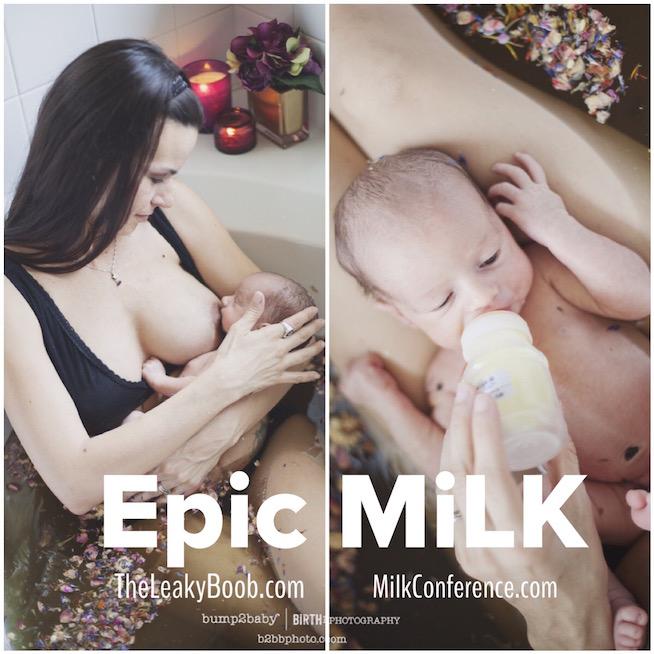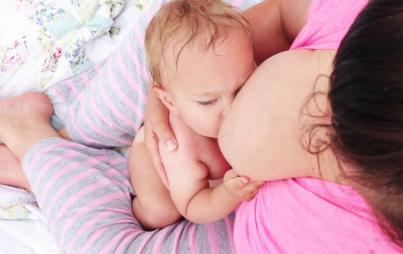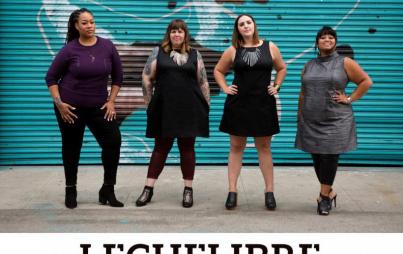
Epic milk
In a way, I understand it really, messages come at us from everywhere about what is beauty and most importantly for women, what is sexy. Because, really, if a woman doesn’t have sex appeal, what does she have?
When you look at this photo, what do you see? Nudity? Adult content? Cleavage? All about the breasts? Or babies being fed?
Facebook deemed this photo inappropriate for sponsorship (paid advertising), saying it was adult content for nudity. All we wanted to do was promote Milk, a MommyCon conference with The Leaky Boob all about feeding babies, a conference focusing on building up families and supporting them no matter how they feed their babies. It certainly isn’t about adult content or nudity, not even about breasts. It is about feeding babies.
Scary babies being fed! Oh no, the eyes! They burn! Hide the feeding babies!
It was surprising in part because Facebook has demonstrated that they’re ok with breastfeeding, finally. And by “ok with breastfeeding” I mean only sometimes deleting breastfeeding photos and suspending accounts but hey, progress is progress. Mostly. Photos are still being deleted when users report photos on personal profiles and pages from time to time (nothing says friendship like reporting a “friend’s” photo of them feeding their baby posing lewdly for the camera while holding their infant) but overall the situation with Facebook and breastfeeding photos has improved. Advocates and users can give themselves a pat on the back: we did it, we got Facebook to mostly stop deleting photos of babies being fed! V for victory!
Well, mostly. Maybe. . .
This step, which goes a long way in putting a stop to shaming practices against women feeding their babies, isn’t all there is. Due to the over emphasis on the sexual nature of the female mammary glands, for many, exposed breasts, well specifically exposed female breasts, are deemed inappropriate nudity. Man-boobs are A-O-KAY! No such thing as a nip slip, side boob, or too much chest showing for a man. As a result, Facebook and many other media outlets carefully censor out uncovered female breasts (some are legally required to protect the world from scary she-boobs) because, as previously mentioned, eye balls will burn out of heads all around the world should she-breasts be viewed.
Their careful managing of she-breasts is understandable given the archaic notion that women’s bodies are sex traps for men and really, many of us appreciate the efforts to minimize objectifying women and putting a full stop on focusing on female bodies as purely for the pleasure of the male gaze. Better to make sure eyes aren’t burning — and men aren’t driven mad being unable to control themselves — than to allow any she-breasts exposed, even if they are exposed doing that pesky “feeding” thing. By not accepting any advertising dollars for exposed she-cleavage and she-breasts in any sponsored posts or ads, Facebook ensures that objectification of women doesn’t happen at all on their site! Ever!
If you buy that, I have some magic beans with “fertilizer” to sell you too.
All this fear complicates babies being fed as the tiny human mammals are biologically programed to suckle she-breasts, specifically their mother’s lactating she-breast, and when such feeding of human mammals is visible, it incites a strange reaction from some. How can it be possible that she-breasts could have two functions?! How is this not all about sex because sometimes she-breasts are about sex? How it this not obscene!
Baby-feeding, obscene.
Congratulations world, we now get baby feeding confused with child abuse and sex.
But really, do we have to see that? Why is it necessary to post those photos? I mean, why do we have to see women at all? Or at least, why do we have to see them as mothers at all?
In a way, I understand it really, messages come at us from everywhere about what is beauty and most importantly for women, what is sexy. Because, really, if a woman doesn’t have sex appeal, what does she have? With such emphasis placed on she-breasts for sex and how awesome they are (in a Godzilla sort of awesomely-terrifyingly-sexy way), and all the efforts to hide those awesomely-terrifying-sexy she-breasts, it really isn’t any wonder that we must not risk seeing them even for feeding a baby. What if the baby’s head moves and she-breast or worse, she-nipple is visible?
Burning eyes.
So Facebook plays it safe. While breastfeeding photos can be posted freely according to Facebook’s community interaction guidelines, when it comes to what they will accept advertising dollars for — there will be no nudity, no sex, no she-cleavage, no she-breasts, and no baby feeding. Well, that’s not exactly true. Turns out babies being fed with devices designed to be like the lactating she-breast — with nipples and everything — are acceptable in advertising on Facebook. Just not babies being fed by she-breasts. Oh and she-breasts are ok sometimes, like if they’re on an acceptable “hot” woman in a swimsuit or lingerie, covered (but only just enough to entice).
Women may be more than a pair of tits, but are they really human?
What’s really sad about this particular image being rejected for adult content and nudity is that the whole point was to show that feeding babies is beautiful, that infant feeding isn’t some kind of competition. Bottle feeding, formula feeding, breastfeeding, and alternative feeding such as tube feeding are all an important part of parenting. A message like this is desperately needed on social media, something a formula company recognized earlier this year with a hit viral video ad, which of course didn’t show breastfeeding — those she-breasts were covered up too.
The MiLK Conference, MommyCon, and The Leaky Boob want to uncover all infant feeding though, not just one methodology.
Founded on the belief that infant feeding support makes a difference and can directly influence confidence levels in parents, MiLK focuses on information sharing and mindful support that builds parents up without tearing down, respecting the unique journey of each of us. Bringing together health care providers, parenting advocates, infant feeding influencers, and parents for workshops, seminars, centered around conversation supporting feeding our babies. From researchers on infant sleep such as Dr. James McKenna to blogger Suzie Barston from the Fearless Formula Feeder, the event we wanted to pay Facebook to promote is about building people up with support in feeding their babies.
There is controversy surrounding feeding our babies, in part because women’s bodies are involved, and our society has loved exercising control and criticism over women’s bodies for a long time — as evidenced by what social media outlets deem appropriate or inappropriate about women’s bodies. But that’s not all there is to it, the topic is charged because it isn’t as clear cut as science or right and wrong or best and worst. Feeding our babies is an Epic Milk experience and each journey is an individual quest. How we emerge from the adventure can leave lasting marks on how we see ourselves. For good or for bad.
And, unfortunately, so can media outlets such as Facebook refusing to allow images of babies being fed by female mammary glands. A pervasive message warning women that their bodies are dangerous or freaky. Scary she-bodies.
Scary baby-feeding.







![By si.robi (Williams S. WM16 (20)) [CC BY-SA 2.0 (https://creativecommons.org/licenses/by-sa/2.0)], via Wikimedia Commons By si.robi (Williams S. WM16 (20)) [CC BY-SA 2.0 (https://creativecommons.org/licenses/by-sa/2.0)], via Wikimedia Commons](/sites/default/files/styles/profile/public/images/article/2019-06/Serena%2520.png?itok=5YupgjTS)
